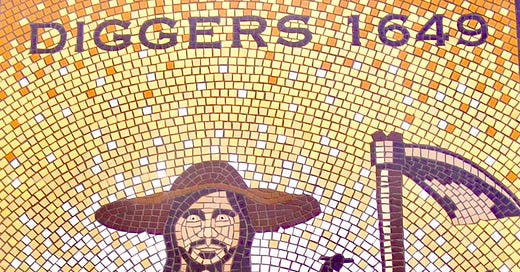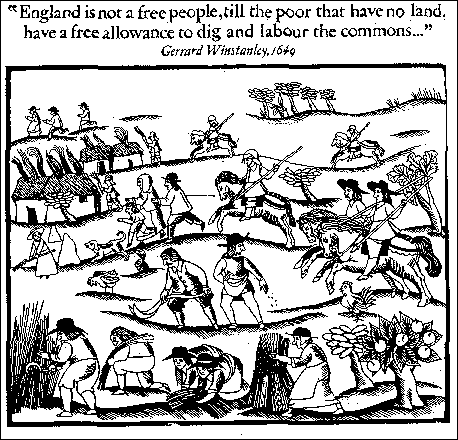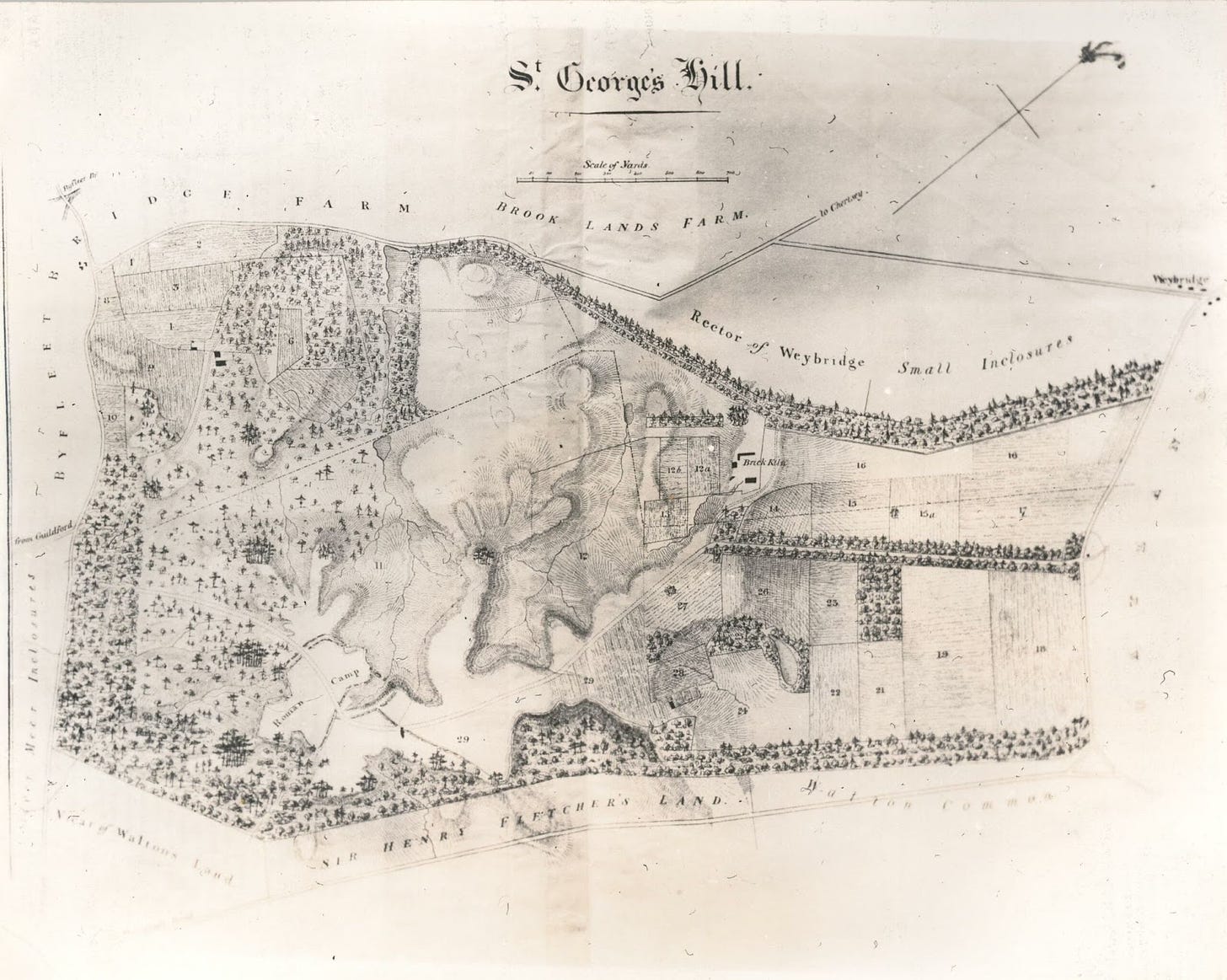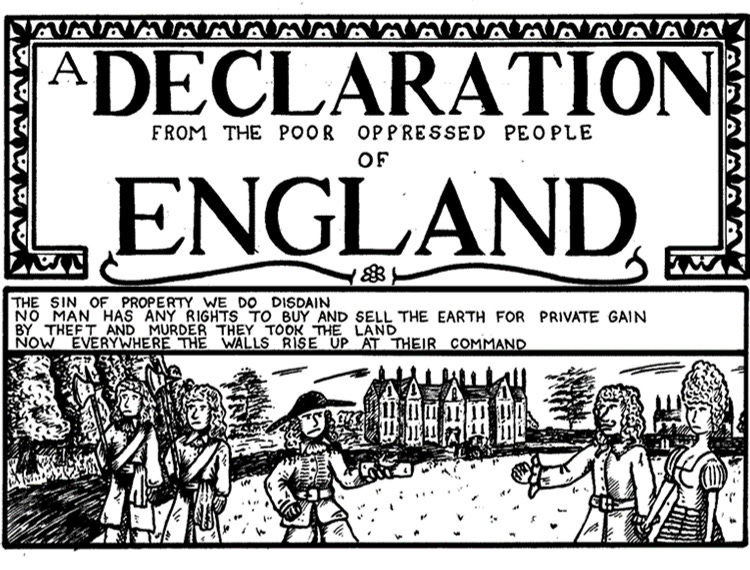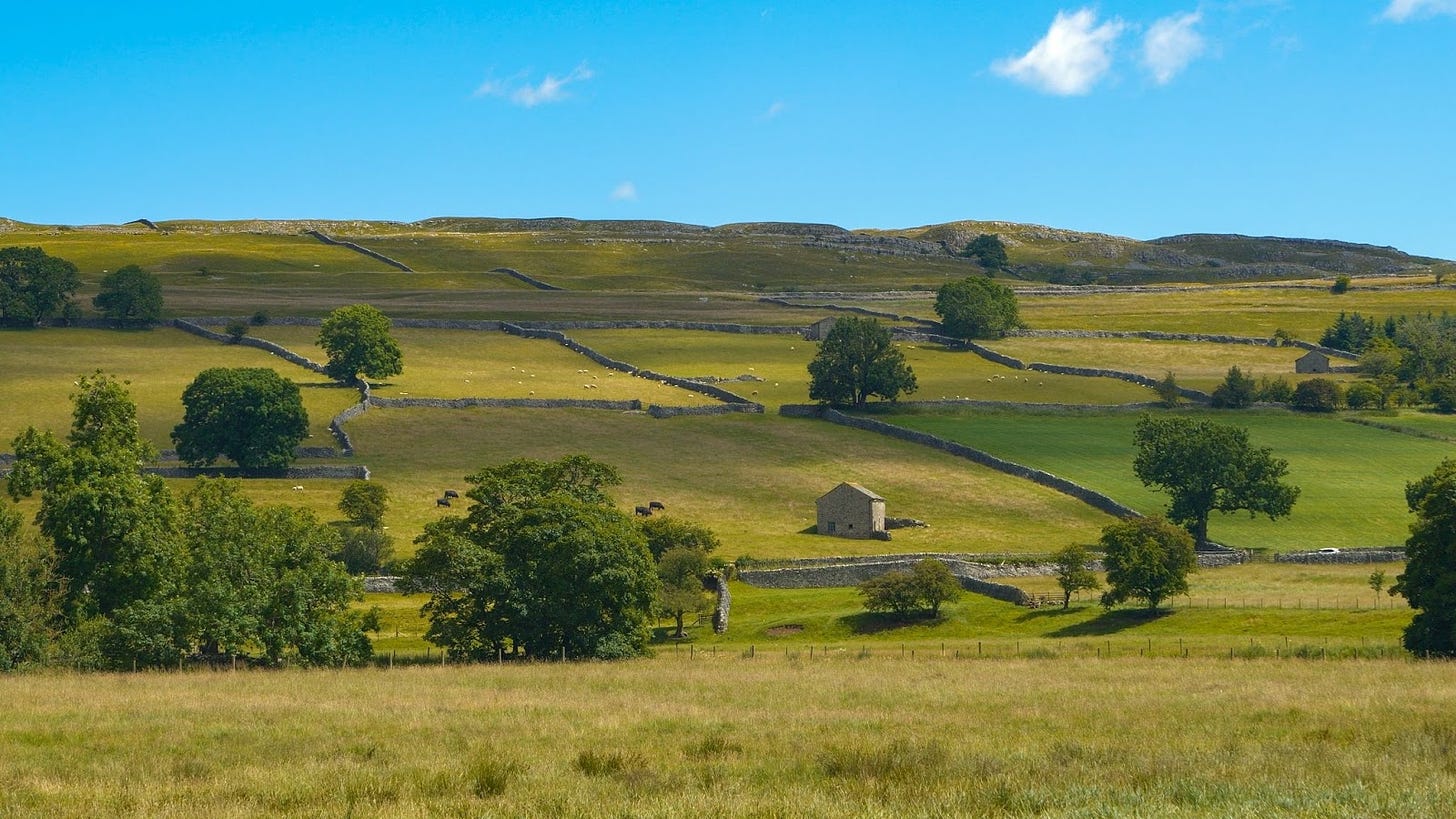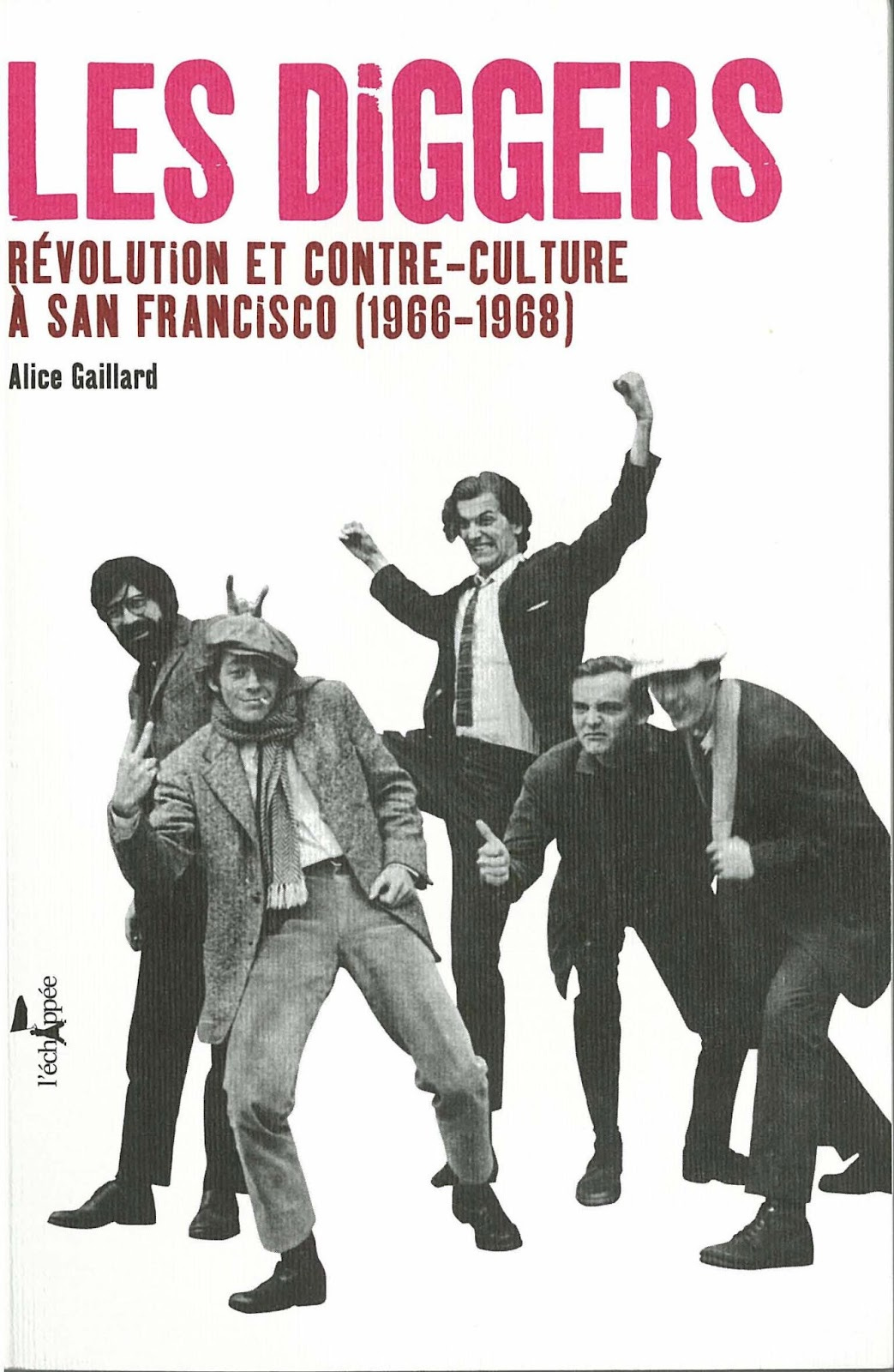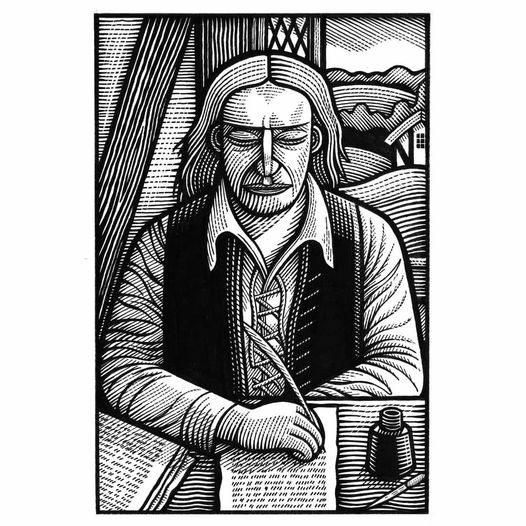Thou Doth Protest? How The Diggers Reclaimed the Commons and Fought Early Capitalism
Learn About the Radical Solidarity and Resistance to the Enclosure of the Common Lands in 17th-Century England.
Photo by Radical English History
Amidst 17th-century England’s political and social upheavals, radical Protestants known as The Diggers emerged, offering a revitalized alternative to the development of private property and capitalism. Today we grow accustomed to the right-wing, reactionary evangelical caucus that crowds out others in politics. Believe it or not, most Christians used to be more community-minded like caring for the poor and migrants.
Acts 4:32 “Now the whole group of those who believed were of one heart and soul, and no one claimed private ownership of any possessions, but everything they owned was held in common.” (Bible)
These Protestants split from the Levellers, an earlier group, but they shared a belief in common ownership - a type of agrarian socialism. At their core, The Diggers practiced what we now recognize as mutual aid, seeking to create a society rooted in communal living, cooperation, and resource sharing. Their story, though brief, carries lessons for today’s struggles around land rights, inequality, and community solidarity.
Diggers’ History
Photo via Spartacus Educational
The Diggers arose in the aftermath of the English Civil War (1642–1651), a time when England was grappling with a power vacuum after the execution of King Charles I and the collapse of the monarchy. The war had left deep scars on the nation, not only politically but also economically.
The ruling class seized land, consolidating wealth through "enclosure," which privatized what had once been communal land. The process was outsourced and repeated across the world in a process known as colonialism—like how Europeans displaced Native Americans. Enclosure displaced many people, especially the poor that enclosure created, from the land they relied on for survival.
Out of this context, The Diggers emerged. Led by Gerrard Winstanley, they believed in a radical idea: that land should be held in common, free for all to work and benefit from. Winstanley articulated this vision in a series of pamphlets, advocating for abolishing private property and creating a society based on common ownership, where people worked the land collectively to meet everyone's needs.
Occupation of St. George's Hill
Photo via Elmbridge Museum
In April 1649, Winstanley and his followers took direct action. They occupied St. George’s Hill in Surrey, a piece of common land, and began digging and planting crops, hence their name, "The Diggers." This act was both symbolic and practical—it challenged the legitimacy of the land enclosures and sought to demonstrate how communal living could work in practice.
The Diggers worked together to build homes, plant food, and share resources equally among themselves and those in need. They operated on principles of cooperation, ensuring that no one went hungry or without shelter. Their motto was simple: "Work together, eat bread together." This was a radical form of mutual aid, rooted in the idea that the earth’s resources should be a treasury available to all, not hoarded by a few.
Mutual Aid and Communal Life
Photo by History of England
The Diggers’ way of life was based on shared labor and mutual support. Unlike the emerging capitalist system, which thrived on labor exploitation, privatizing common lands, and competition between neighbors, The Diggers believed that everyone should contribute according to their ability and receive according to their need. They emphasized collective ownership and self-sufficiency, rejecting the idea of personal profit in favor of the common good.
“In the beginning of Time, the great Creator Reason, made the Earth to be a Common Treasury, to preserve Beasts, Birds, Fishes, and Man, the lord that was to govern this Creation; for Man had Domination given to him, over the Beasts, Birds, and Fishes; but not one word was spoken in the beginning, That one branch of mankind should rule over another.”
- The True Levellers Standard Advanced
Their communal living also extended beyond material goods. The Diggers fostered a sense of solidarity and equality, rejecting the rigid social hierarchies of the time. Their gatherings were inclusive, with decisions made collectively rather than dictated by a single leader or elite group. In this way, they practiced what we now call consensus decision-making, a cornerstone of many mutual aid groups today.
Enclosure Starts Capitalism
Photo by Flystock via Shutterstock
While this post focuses on The Diggers' mutual aid practices, it’s impossible to ignore the critique of capitalism embedded in their actions. The enclosures they opposed were a key mechanism of early capitalist development, concentrating land and wealth into fewer hands while displacing the common people.
The enclosure of common lands gave peasants no choice but to sell their labor for wages to survive - the coercive inception of capitalism. The Diggers’ reclamation of St. George’s Hill directly challenged this system, aiming to create a more equitable society where land and resources were shared.
Their struggle against enclosure resonates today in the fight against gentrification, land grabs, and the privatization of public goods. The Diggers’ vision remains a powerful critique of a system that prioritizes profit over people, one that still denies access to basic needs like housing and food.
The Diggers of San Francisco, CA
Photo by The Diggers
The Diggers in California were an influential group of activists and artists based in San Francisco’s Haight-Ashbury district during the 1960s. Inspired by the original Diggers, this CA group was formed with a vision to create a society rooted in community cooperation, radical sharing, and mutual aid. They aimed to subvert the capitalist norms of property ownership and consumer culture.
The Diggers provided free meals, clothes, medical services, and even organized street theater to spread messages challenging capitalist values. Known for their Free Stores and Free Food Program, they distributed essentials without charge, using items donated or salvaged from excess. They set up a daily free kitchen at Golden Gate Park, serving meals with the slogan "It’s free because it’s yours," symbolizing the abundance that could emerge from community-driven redistribution.
Beyond food and goods, they produced The Digger Papers, publishing ideas about living outside capitalist structures. They hoped to model an alternative society by rejecting private property and hierarchies, creating a space where people could live, work, and create collectively. Their ethos of direct action and communal living laid a foundation for the broader countercultural movement of the 1960s and influenced future mutual aid practices across activist movements.
The Legacy of Diggers
Photo by True Level Media
Although the Diggers were ultimately suppressed by landed nobles and the state, their legacy endures. They provided an early model of direct action, communal living, and mutual aid that inspires movements today. From modern land occupations to cooperative housing projects, their belief in the power of collective action lives on.
The Diggers remind us that mutual aid is not just about providing immediate relief; it’s about challenging the systems of power that create inequality in the first place. By reclaiming land and resources for the common good, they offered a blueprint for how communities can resist exploitation and build a more just world.
They may have lasted just a few years, but The Diggers of San Francisco showed a different way to live through life acting. Free Stores exist in many forms today, and the music festival culture has become normalized. The Diggers saw that disconnectedness and economic inequality were two of the biggest concerns for people. We can revitalize our communities today by choosing to embody the lives we want to live.
Just as Gandhi proclaimed, “Be the change you wish to see in the world.” We will see change when people decide to live differently - perhaps returning to shared community life. Our environment demands we adapt to changing circumstances created by the externalities of industrialized capitalism. As Peter Kropotkin reminds us, those who work together stand the best chances of survival. Enclosure from one another doesn’t serve us any longer.
Beyond Darwinism - Mutual Aid Index
Beyond Survival of the Fittest: Kropotkin's Vision of Mutual Aid
What is the role of solidarity and reciprocity in building equitable and sustainable communities?
Mutual Aid Among Plants and Animals: Cooperating for Survival
Peter Kropotkin Observes How Cooperation Among Species Improves Survival and Shapes Evolution.
Frolics and Barn-Raisings: Mutual Aid Amongst the Amish
Take a Look at the Amish Traditions of Collective Action and Solidarity.
The Arab Spring: Mutual Aid in the Fight for Freedom
See Solidarity in Action with the Collective Struggle for Liberation in the Arab Spring Movements.
The Black Panther Party’s Legacy of Community Empowerment Through Mutual Aid
The BPP protected and served their communities despite rampant racism and being the main targets of the FBI’s Counter-Intelligence Program.
Blessing Boxes: Mutual Aid in Our Communities Today
Find Out How These Simple Free Community Pantries Transform Neighborhoods and Promote Solidarity.
Childcare Collectives: A Modern Expression of Mutual Aid
Childcare Collectives develop when families, friends, and neighbors pool their resources to raise children.
Feeding Hope: The Impact of Community Fridges as Mutual Aid
See How Grassroots Efforts Like Chattanooga’s Hope Community Fridge Transforms Food Access and Fights Food Apartheid.
Grow Food Together: The Impact of Community Gardening as Mutual Aid
Shared Gardens Enhance Food Security, Build Community Bonds, and Promote Well-being Without Personal Expense.
Community Self-Defense: Protecting Ourselves and One Another
Let’s Talk About How Communities Work Together to Protect Themselves From Harm Inflicted by the State and Fascists.
Community Workspaces: Where Coworking Meets Opportunity
Find Out How Shared Community Workspaces Support Creativity and Mutual Empowerment.
Deciding Together: The Consensus Model in Mutual Aid
How Collective Decision-Making Builds Strong and Resilient Movements As Shown by Occupy Wall Street.
Live Together, Thrive Together: Shared Housing as Mutual Aid
Imagine Housing as a Way to Build Community and Share Resources.
Breaking Bread, Building Bonds: What’s Cooking in Community Kitchens?
Learn How These Shared Kitchens Create Lasting Change Through Healthy Meals, Cooking Education, and Mutual Aid.
Migration and Mutual Aid: Navigating a Climate Crisis Together
The USA and Global North Grew Rich Burning Fossil Fuels. Radical Cooperation Can Help Us Adapt to a Changing World.
Forgive Us Our Debts: How Debt Collective Helps Abolish Financial Servitude
Debt Collective Branched Off From Occupy Wall Street and Unifies Debtors in Mutual Aid for Collective Liberation.
Thou Doth Protest? How The Diggers Reclaimed the Commons and Fought Early Capitalism
Learn About the Radical Solidarity and Resistance to the Enclosure of the Common Lands in 17th-Century England.
A World Without Barriers: Consider Accessibility in Mutual Aid
Everyone Becomes Disabled if They Are Lucky. So How Can We Make Our World More Accessible?
Mutual Aid in the Eye of the Storm: Disaster Relief Amid Climate Change
When Disaster Strikes, Mutual Aid Responds: A Blueprint for Resilience Amid More Frequent Catastrophes
Beyond the Ballot Box: Build Dual Power for Real Change
Empower People Through Mutual Aid, Solidarity, and Community Control.
Communities of Care: How Solidarity Transforms Support for Elders and the Differently-Abled
How Can Mutual Aid Principles Change Elderly and Disabled Care From Isolation to Connection?
Growing Resistance: How Food Forests Feed Communities for Free and Defy Capitalism
From Commodities to Commons: The Radical Potential of Agroforestry
Roots of Resilience: Black Mutual Aid Societies in American History
Explore W.E.B. Du Bois’ Work and the Heritage of Solidarity Among Black Folk.
From Despair to Dignity: The Radical Work of Free Clinics
How Mutual Aid and Community Solidarity Transform Access to Healthcare
Feeding Each Other: The Radical Power of Free Grocery Stores
How This Kind of Mutual Aid Transforms Hunger Relief into Community Empowerment
Challenge Capitalism One Free Store at a Time
How Free Stores Empower Communities and Challenge Scarcity
The Past & Future of Self-Governance: How General Assemblies Build Dual Power
Strengthen Communities Through Direct Democracy and Mutual Aid
Let Joy Guide You: The Power of Fun in Change Work
Explore the Role of Laughter, Creativity, and Connection in Community Organizing
Fascism Unmasked: How to Recognize and Resist Modern Authoritarianism
Empower Your Resistance: A Practical Guide to Revolutionary Optimism, Mutual Aid, and Defying Totalitarians
Resist Burnout: Care, Coping, and Wellness in Dark Times
How can we practice self-care to endure the revolutionary marathon and better support one another?
Resistance Anthems: Protest Music for Hard Times
Let’s Unite Our Voices For Justice Through the Power of Music!
Affinity Groups: Decentralized Resistance in an Age of Crises
How Do Small, Autonomous Collectives Build Power and Resistance Against Fascism, Capitalism, and Collapse?
Share a Feast: How Potlucks Build Community and Connection
Let’s Discuss How Sharing Food Nourishes Both Bodies and Bonds Across Generations.
Notes From the Underground: How Forests Teach Mutual Aid
How Do Fungi, Trees, and Other Plants Thrive Through Cooperation and Reciprocity?
Fight Book Bans with Little Free Libraries
How Do Little Free Libraries Turn the Tide Against Book Bans and Censorship?
Read, Rest, Revolt, Repeat: Study Groups as Mutual Aid
How Does Collective Study Build Power, Sharpen Strategy, and Sustain Movements?
Burn After Reading: Comms Discipline for Mutual Aid and Resistance
Think About Encryption, VPNs, Walkie-Talkies, and the Lost Art of Keeping Your Mouth Shut.

